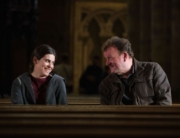British filmmaker Stephen Frears teams up with his Philomena (2013) screenwriters Steve Coogan and Jeff Pope to depict another, if less emotionally resonant, real-life underdog on a quest, this time not to find a lost child but a lost monarch.
The sovereign in question is the much-maligned Richard III, killed at the Battle of Bosworth Field in 1485 by the supporters of his Tudor rival, Henry VII. The remains of England’s last Plantagenet king had vanished until they were dug up in 2012 in a Leicester car park. Driving the campaign that led to this historic exhumation was amateur historian Philippa Langley. The film is based on her account in The King’s Grave: Looking for Richard III, co-authored with Michael Jones.
As the movie opens, a distraught Philippa (a committed Sally Hawkins), sidelined by ageism and chronic fatigue syndrome, has been bypassed for a promotion at her Edinburgh sales office. At home, she vents to her ex-husband, John (a low-key Coogan). Although separated, they remain friends and share child-rearing duties. When she takes her son to a local production of Shakespeare’s Richard III, Philippa’s interest in the vilified king is sparked. “I can’t believe someone could be that wicked because of a disability,” she tells friends at the intermission. It doesn’t hurt that the hunchbacked Richard (as the playwright depicts him) is played by a handsome actor (Harry Lloyd).
Her curiosity turns into a consuming passion as she researches her subject via piles of books, cozy pub chats with fellow Ricardians (who believe Tudor propaganda has misrepresented Richard), a white-gloved examination of ancient records (archivists will cringe at this scene), video calls with other amateur historians, and lectures where her contrarian views are mocked by condescending academics.
Philippa also envisions a spectral Richard (Lloyd again), who silently encourages her to find the dead king’s body and have him reburied properly as a legitimate monarch. When she asks John to give up his apartment and move back in to save money and free her up for her project, he notes dryly, “I feel like I am being cuckolded by a ghost.” But John’s support for his ex-wife is unwavering after she explains how the quest has made her happy and energized.
Given that it actually took about eight years before the archaeological dig could happen, the screenwriters, for narrative purposes, have compressed the story line into a vague timeframe, which weakens the film’s believability. Likewise, to enhance the drama, they chose to transform the other participants in the dig—archaeologist Richard Buckley (Mark Addy) and University of Leicester’s deputy registrar Richard Taylor (Lee Ingleby)—into one-dimensional villains who shunt Philippa to the side and assume full credit for the discovery of Richard’s skeleton.
It also sidelines the scholarly research of other historians like the late David Baldwin, who was one of the first to pinpoint the car park as a potential burial site, in favor of Philippa’s woo-woo instincts. Early on in her quest, she visits the Leicester car park, stands on the letter R (for “Reserved”), and senses Richard’s presence. After the real-life participants complained about their onscreen portrayals last year, it is no surprise that the film opens with the defensive foreword, “Based on a true story. Her story.”
Additionally, the film has an odd tone, as if it can’t decide if it is a historical thriller (cue Alexandre Desplat’s anxious Bernard Herrmann–like score in the opening credits) or a comic portrait of oddball obsessives (one historian Philippa interviews sports a Richard III pageboy hairdo).
Hawkins’s performance as the Richard-fixated Philippa could have easily veered into creepy serial killer fangirl territory (the jury is still out on whether the king murdered his nephews to claim the throne), but her sympathetic turn as an underappreciated woman who finds a new purpose in life will appeal to many viewers. The movie’s an enjoyable watch, but add a historical grain of salt to your popcorn.

















Leave A Comment